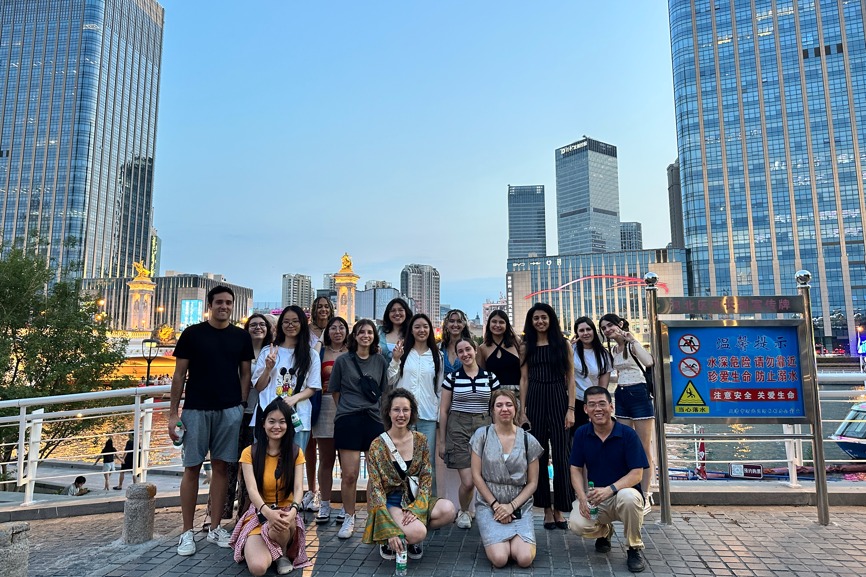Administrative review provides impartial means to settle disputes


After four years of appealing and waiting, Dongsheng Nursing Home, a private company in South China's Hainan province, eventually regained in 2020 its right to use 14 hectares of land through administrative review.
The company won the case against the Haikou city government in the province's capital city through administrative reconsideration in 2016, but the government failed to follow through on the decision to return the land rights until the Ministry of Justice agreed to review the case last year.
As an important means to bolster the development of a law-based government, China has consistently promoted the administrative review mechanism to impartially and efficiently resolve disputes and protect the legitimate rights and interests of the people.
Building a law-based government is key to the nation's efforts to implement overall law-based governance, and the task should be jointly promoted with law-based administration, according to Xi Jinping Thought on the Rule of Law, which was defined at a central conference in November as the fundamental guideline for overall law-based governance in China.
The Thought calls for defining rules and boundaries for administrative power, standardizing administrative decision-making procedures and speeding up the transformation of government functions, as well as promoting fair and civilized law enforcement to enhance judicial credibility.
Administrative review is initiated by citizens and organizations that believe that administrative acts have infringed on their legitimate rights and interests. They can appeal to the upper-level organizations of those they believe have infringed on them, and the organizations that have the authority to review the case will examine the legality and rationality of the acts and provide a resolution. Those who are not satisfied with the result can sue the administrative department to settle the dispute.
From 1999 to the end of last year, administrative review organizations nationwide handled about 2.69 million cases, and they registered and concluded 2.23 million cases. Last year alone, they dealt with 242,000 cases and made corrective decisions, including either rescinding or altering the administrative acts in question or confirming the administrative acts as illegal, in 14.6 percent of the cases that were dealt with, according to the ministry.
A specific law for the administrative reconsideration system took effect in 1999. It was amended twice, in 2009 and again in 2017, to meet changing demands.
Administrative review and litigation are the two main channels through which administrative disputes can be resolved in China. Many disputes can be resolved during review, which eases the burden on the court system, leaving litigation as a last resort, said Yang Weidong, a law professor at China University of Political Science and Law.
"Once a dispute occurs, there should be a channel to resolve it," he said. "The administrative review system is designed to solve disputes between the government and the people. It is a critical part of building a law-based government and plays a role in restricting administrative power. Lacking such a restriction would make the administrative system incomplete," he said.
As citizens usually feel weak when faced with government departments' strong administrative power, and they may think they cannot win, the right of a person to request an administrative review or pursue litigation puts the government and the public on equal footing to resolve problems, Yang said.
Impartiality crucial
With litigation, judicial organs are tasked with solving disputes, but reviews are still handled by administrative organs or local governments at the same level. Therefore, it is critical that review organs deal with cases impartially, Yang said.
"What matters in such a dispute resolution system is fairness. Particularly, when a case involves the government, the public will focus on whether it will be handled properly, and any perceived unfairness could tarnish the government's authority," he said.
In the Haikou case, Dongsheng Nursing Home bought the land in 2010 and signed a contract with Haikou's land and resources bureau to get a permit for the right to use the land. However, a ruling issued by the Haikou government in September 2015 changed the usage requirements of the land. The bureau then sent a notice to the company to rescind the land grant contract and refund the fees involved.
In November 2015, the company applied for administrative reconsideration to the Hainan Provincial People's Government to protest the action. The provincial government decided that the Haikou government's actions failed to follow the conditions and procedures prescribed by laws and regulations, and the actions should be rescinded.
However, the Haikou government had not implemented the rescission decision and suspended the case, bringing huge economic losses to the company. In March 2020, the company sent the administrative reconsideration materials to the Ministry of Justice, applying for the State Council to supervise the implementation of the decision.
After review and investigation, the ministry's Bureau of Administrative Reconsideration and Response sent a notice in December urging the Haikou government to implement previous administrative reconsideration decisions within a required time, and the case was eventually resolved later that month.
The administrative reconsideration system is under reform as required by the Commission for Comprehensive Law-Based Governance of the Communist Party of China Central Committee. In April last year, the commission asked relevant authorities to revise laws and regulations and build a standard and scientific administrative reconsideration system.
The Ministry of Justice issued a statement soliciting public comments on the amendment for the administrative reconsideration law in November, saying that several problems had been uncovered in the system, including decentralized resources, a lack of unified case handling standards, narrow scope of accepting cases, the same process for complicated and simple cases, overreliance on reviewing written materials, and a weak connection between administrative reconsideration and administrative litigation.
In August, the Central Committee of the CPC and the State Council jointly issued an outline for building a law-based government (2021-25), requiring reform of the administrative review system and establishment of a fair, authoritative, unified and efficient administrative review system by the end of 2022.
It also called for improving the quality and efficiency of case handling, establishing administrative review committees above county-level governments to provide advice on major, difficult and complex cases, posting of administrative review decisions online and supervising of decision implementation.
Need for supervision
The ongoing reform focuses on the fairness of the system and meets the expectations of the public, but a system for tight supervision of the reconsideration organs is still required, Yang said.
Mo Jihong, a law professor at the Chinese Academy of Social Sciences, said that administrative review organs and government departments alike need to act in strict accordance with the law and work constantly to improve the system to promote the standardized and transparent operation of administrative power.
The reform should make case handling procedures in reconsideration organs more open and better able to meet the demands of the public, Mo said.
"Administrative reconsideration is an important hierarchical supervision system within the government to regulate governmental departments' acts," he added. "Also, the departments must consciously standardize the use of their power and cannot wait to correct mistakes after they've been identified through post-supervision procedures. The problems should be resolved at the source."
- Two dead, two missing after torrential rainfall in Hebei
- Recall vote shows DPP's manipulation runs against Taiwan people's will: mainland spokesperson
- Expert: 'Taiwan independence' has no future
- Closed-door seminar highlights China's push for autonomous delivery
- Shanghai district boosts Yangtze Delta integration with 40 new projects
- International award winners among Shanghai audience for World AI Conference




































